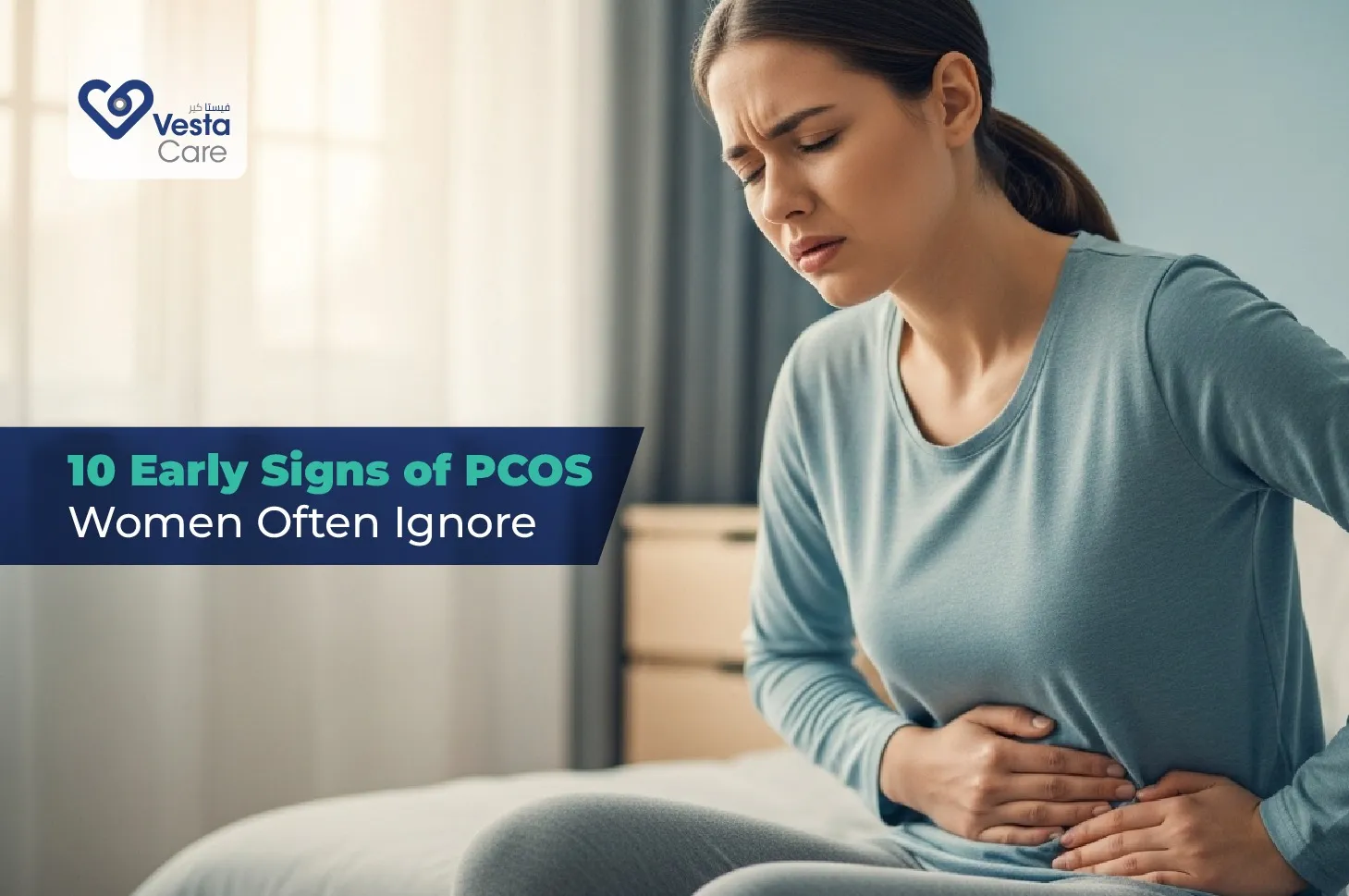Polycystic Ovary Syndrome (PCOS) affects approximately 1 in 10 women of reproductive age, making it one of the most common hormonal disorders worldwide. Despite its prevalence, many women live with PCOS for years without realizing they have the condition. The symptoms often develop gradually and can be easily dismissed as normal variations or attributed to other causes entirely.
Understanding the early warning signs of PCOS is crucial because early detection and management can prevent long-term health complications including type 2 diabetes, cardiovascular disease, and fertility challenges. This comprehensive guide explores ten early signs of PCOS that women frequently overlook, helping you recognize when it's time to seek medical evaluation.

1. Irregular or Absent Periods
One of the most significant yet often ignored signs of PCOS is menstrual irregularity. While many women experience occasional cycle variations, persistent irregularity warrants attention. Women with PCOS may have fewer than nine periods per year, cycle longer than 35 days, or stop menstruating altogether.
Many women normalize irregular periods, especially if they've experienced them since adolescence. However, consistent menstrual irregularity indicates hormonal imbalance that requires proper medical assessment. This irregularity occurs because PCOS disrupts normal ovulation, preventing the regular monthly release of eggs from the ovaries. You can easily book hormone test at home in Dubai.
2. Unexplained Weight Gain or Difficulty Losing Weight
Sudden weight gain, particularly around the abdomen, is a common early sign of PCOS that women often attribute to lifestyle changes, stress, or aging. Women with PCOS frequently struggle to lose weight even with diet and exercise due to underlying insulin resistance.
This metabolic challenge creates a frustrating cycle where insulin resistance promotes weight gain, and excess weight worsens insulin resistance. If you've noticed unexplained weight changes despite maintaining consistent eating and exercise habits, PCOS could be the underlying cause requiring professional evaluation.
3. Excessive Hair Growth in Unusual Places
Hirsutism, characterized by dark, coarse hair growth on the face, chest, back, or abdomen, affects approximately 70 percent of women with PCOS. This excess hair growth results from elevated androgen (male hormone) levels in the body.
Many women feel embarrassed about this symptom and attempt to manage it privately through shaving, waxing, or depilatory creams without consulting healthcare providers. However, hirsutism is a significant clinical sign of hormonal imbalance that deserves medical attention rather than just cosmetic treatment.
4. Persistent Acne Beyond Teenage Years
Adult acne, particularly deep cystic acne on the lower face, jawline, chin, and upper neck, can indicate PCOS. While many people experience occasional breakouts, persistent adult acne that doesn't respond well to typical treatments may signal underlying hormonal issues.
The elevated androgen levels in PCOS increase sebum production, creating an environment where acne-causing bacteria thrive. Women often spend years trying various skincare products and treatments without addressing the root hormonal cause.
5. Thinning Hair or Male-Pattern Hair Loss
While excess facial and body hair grows, many women with PCOS simultaneously experience thinning scalp hair or male-pattern baldness. This contradictory symptom occurs due to the same elevated androgens causing facial hair growth.
Hair thinning typically appears at the crown or along the hairline and is often attributed to stress, nutritional deficiencies, or genetics without considering PCOS as a potential cause. This symptom can significantly impact self-esteem and quality of life.
6. Dark Patches of Skin
Acanthosis nigricans—thick, dark, velvety patches of skin—commonly appears in body folds and creases, including the neck, armpits, groin, and under the breasts. These patches indicate insulin resistance, a core feature of PCOS affecting up to 70 percent of women with the condition.
Many women mistake these patches for poor hygiene or simple skin discoloration, attempting to scrub them away rather than recognizing them as metabolic warning signs requiring medical evaluation.
7. Chronic Fatigue and Low Energy
Persistent tiredness that doesn't improve with adequate rest is frequently dismissed as a normal consequence of busy modern lifestyles. However, chronic fatigue is a significant symptom of PCOS related to hormonal imbalances, poor sleep quality, and insulin resistance.
Women with PCOS often experience energy crashes, particularly after meals, due to blood sugar fluctuations. This symptom significantly impacts daily functioning but is rarely connected to PCOS without comprehensive evaluation.
8. Mood Changes and Mental Health Challenges
Depression, anxiety, mood swings, and emotional instability occur at significantly higher rates in women with PCOS compared to the general population. The hormonal fluctuations, physical symptoms, and fertility concerns associated with PCOS contribute to these mental health challenges.
Unfortunately, these symptoms are often treated in isolation without exploring underlying hormonal causes. Many women struggle with mental health issues for years before PCOS is identified as a contributing factor.
9. Difficulty Conceiving
PCOS is one of the leading causes of female infertility, yet many women don't realize they have the condition until they attempt to conceive. The irregular or absent ovulation characteristic of PCOS makes natural conception challenging.
Women often undergo numerous fertility tests and treatments before PCOS is properly diagnosed and addressed. Early identification allows for more effective fertility management and better pregnancy outcomes.
10. Sleep Problems and Snoring
Sleep disturbances, including insomnia, poor sleep quality, and sleep apnea, affect many women with PCOS. The hormonal imbalances, weight gain, and metabolic issues associated with PCOS contribute to disrupted sleep patterns.
Women rarely connect sleep problems to PCOS, instead attributing them to stress or lifestyle factors. However, these sleep disturbances can worsen other PCOS symptoms and overall health outcomes.
The Importance of Early Detection and Testing
Recognizing these early signs and seeking timely medical evaluation is crucial for effective PCOS management. Early diagnosis allows for intervention that can prevent or minimize long-term complications, including type 2 diabetes, cardiovascular disease, endometrial cancer, and fertility challenges.
Vesta Care offers comprehensive PCOS testing at home across Dubai, making diagnosis convenient and accessible. Our lab-at-home service provides a complete PCOS hormone panel for just AED 429, testing multiple parameters essential for accurate diagnosis, including testosterone levels, luteinizing hormone, follicle-stimulating hormone, and other key markers.
How General Practitioners Can Help
While PCOS is a complex hormonal condition, general practitioners play a vital role in initial diagnosis, ongoing management, and coordinated care. GP doctors can perform comprehensive physical examinations, order appropriate diagnostic tests including hormone panels and ultrasounds, provide lifestyle counseling on diet and exercise, prescribe medications to manage symptoms and regulate menstrual cycles, monitor for long-term health risks like diabetes and cardiovascular disease, and refer to specialists when necessary.
At Vesta Care, our experienced DHA-licensed GP doctors understand PCOS management and provide personalized care plans tailored to each patient's unique symptoms and health goals. They work collaboratively with you to address immediate concerns while focusing on long-term health outcomes.

Taking the Next Step
If you recognize several of these early signs in yourself, don't wait to seek medical evaluation. PCOS is manageable with appropriate diagnosis and treatment, but early intervention provides the best outcomes.
Vesta Care brings professional healthcare directly to your home anywhere in Dubai. Our doctor on call service operates 24/7, ensuring you can access medical expertise whenever you need it. Whether you require initial PCOS screening, ongoing symptom management, or comprehensive hormone testing, our healthcare professionals arrive at your doorstep within 30-45 minutes.
Conclusion
PCOS often develops gradually, with symptoms that are easily dismissed or normalized. By understanding these ten early warning signs—irregular periods, unexplained weight changes, excessive hair growth, persistent acne, hair thinning, dark skin patches, chronic fatigue, mood changes, fertility difficulties, and sleep problems—you can recognize when to seek medical evaluation.
Remember that experiencing one or two of these symptoms doesn't necessarily mean you have PCOS, but multiple symptoms warrant professional assessment. Vesta Care's comprehensive home healthcare services in Dubai make PCOS testing and management convenient, private, and accessible. Take control of your hormonal health today by scheduling your PCOS screening with our experienced medical team.
Contact Vesta Care now to book your home visit for PCOS testing or to consult our GP doctors about your symptoms. Your journey to better hormonal health begins with recognizing the signs and taking that crucial first step toward diagnosis and treatment.
This article is medically reviewed by:

Recent Posts
Book Your Home Healthcare Consultation Today
Your Health Matters – Reach Out Now and Let’s Discuss How Vesta Care Can Help.











